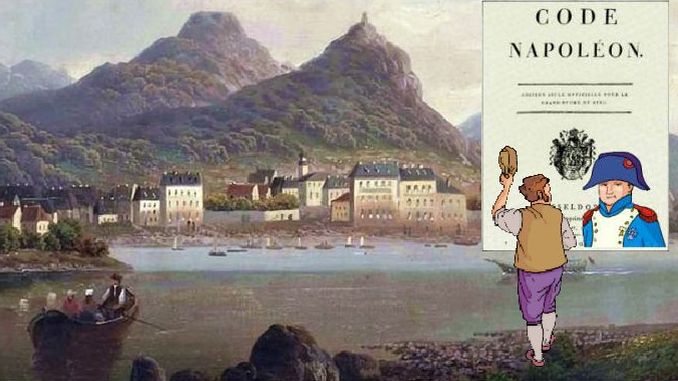
This time has shaped our region, back then the Grand Duchy of Berg, and Napoleon’s laws lasted long beyond his reign. In the Rhineland, the Napoleonic Code was in use until the introduction of the Bürgerliches Gesetzbuch (civil code of Germany) in 1900.
The Rhineland at the end of the 18th century. The French Revolution had shattered Europe’s monarchies. War broke out, Prussian and Austrian armies marched against France. The Jacobins got the upper hand and proclaimed the republic. After their failed escape attempt, King Louis XVI and Queen Marie Antoinette, the youngest daughter of Maria Theresia, were found guilty and executed in 1793.
The French troops stopped the first attack on Paris and stroke back. The Revolutionary Government introduced mass conscription, and the mercenary armies of Prussia and Austria had to fight against a people’s army of men who fought for their country and the ideas of the revolution. Their war song, the Marseillaise, became the national anthem of France.

The Rhine frontier
French troops occupied the left bank of the Rhine. Bonn fell on October 6, 1794. In fact, the Rhine was now the border between France and the Holy Roman Empire. Nonetheless, many people welcomed the French because some achievements of the French Revolution now came to Germany, for instance liberation from serfdom, freedom of trade, abolition of the aristocracy’s privileges, and end of the manorial system.
Meanwhile, Russia, Austria, and Prussia had divided Poland among themselves for a second (1793) and third (1795) time. Prussia under King Frederick William II (1786-1797) had annexed large territories. To concentrate on his new territories in the East, the King negotiated peace with France. As soon as he had compensations for lost Prussian territories on the left bank of the Rhine (Cleves) guaranteed, Prussia quit the coalition against Revolutionary France for more than a decade. Already in the same year, French troops crossed the Rhine to fight against the imperial Austrian troops. Soldiers of both armies marched through our region, and the imperial troops needed quarters and food.
The End of the Old Empire
In France, Napoleon Bonaparte had seized power in his coup d’état of November 9, 1799. Five years later, in 1894, he crowned himself Emperor.
Napoleon’s victories
For years, Austria, Prussia, and Russia were no match for him. Napoleon defeated the Austrians in Italy. In the Treaty of Campo Formio of October 17, 1797, Holy Roman Emperor Francis II (in German Franz II.) had to cede Habsburg territories to France. Moreover, he had to formally acknowledge the Rhine river as the border between France and the Empire; the occupied left bank became French territory. Four years later, on February 8, 1801, the treaty of Lunéville confirmed the annexation of the left bank by France and obliged the Holy Roman Empire to compensate those princes who had lost territories there.
Reichsdeputationshauptschluss
On February 23, 1803, the Reichstag (Imperial Diet) passed a resolution on how to settle these compensations, referred to as the “Reichsdeputationshauptschluss” (in English: Principal Conclusion of the Extraordinary Imperial Delegation). One would secularize the Ecclesiastical states and give their lands to other, usually neighboring secular principalities. In other words, one would dispossess most of the bishops and archbishops were dispossessed. Moreover, almost all small states lost their sovereignty and became part of other, bigger states (mediatization).
On the other hand, some princes gained more for compensation than they had lost. Among the winners were the rulers of Bavaria and Württemberg, they became kings.
Also the Archbishopric of Cologne, an ecclesiastical state, was secularized. Its territories in our region eventually fell to the Counts of Berg, who then ceded them to Napoleon in 1806. Heisterbach Abbey was dissolved and its demolition ordered. The last Archbishop Maximilian Franz of Habsburg, Maria Theresia’s youngest son, had to flee.
Trafalgar and Austerlitz
Austria, Sweden, Russia, and England again joined forces against Napoleon. In the Battle of Trafalgar on October 21, 1805, the French fleet suffered a devastating defeat by the British Royal Navy commanded by Admiral Lord Nelson. Two months later, in the Battle of Austerlitz on December 2, 1805, Napoleon, supported by troops from Bavaria and Württemberg, defeated the armies of the Russian Tsar Alexander I and Emperor Francis II.

Be the first to comment